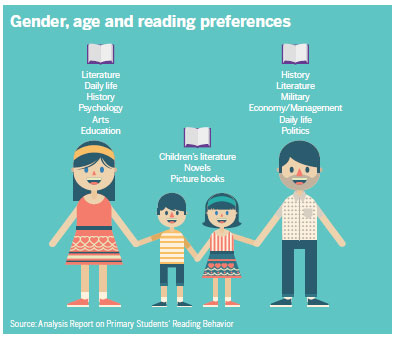Children's reading behavior analyzed

Results suggest reading is more of a task than interest for many Chinese children. Experts urge parents to encourage instead of enforce a love for books.
Primary school students in Shanghai read an average of 15.32 books a year, more than double the books read by adults, a new report has revealed.
According to the Analysis Report on Primary Students' Reading Behavior, which was released earlier this month at a reading festival organized by the Shanghai Women's Federation, about 12 percent of the 140,000 children polled read more than three books a month while 19 percent read one to three books and the others reading less than one book.
In contrast, adults in Shanghai read 6.61 books per year.
The survey, conducted by a third-party firm called PsyLife Education, was conducted throughout 2016.
Children's literature, novels and picture books accounted for nearly three quarters of the top 2,000 books favored by kids. Books related to science, traditional and classical topics and other genres made up the remainder.
The report also found that only 3.5 percent of children in Shanghai read science books, much lower than the figures in Germany and the United States.
According to the report, children usually read between 4:30 pm and 9:30 pm, which is also the time they do their homework. Children are also more likely to read during the weekends than during the winter and summer vacations. In addition, more than half of the books that children read are recommended by adults.
The report by the Shanghai Women's Federation suggested that reading could be more of a task than a hobby for most children.
Zhang Zhijun, a senior editor from Shanghai Education Press, said that parents should encourage instead of compel their children to read.
"Parents should influence their kids to read. For example, in most cases, if parents love to read then their kids would develop an interest in reading," said Zhang.
"Allowing children to engage freely in reading would encourage them to read more. It is important to let them choose the book they want to read."
He Qi contributed to this story.
















